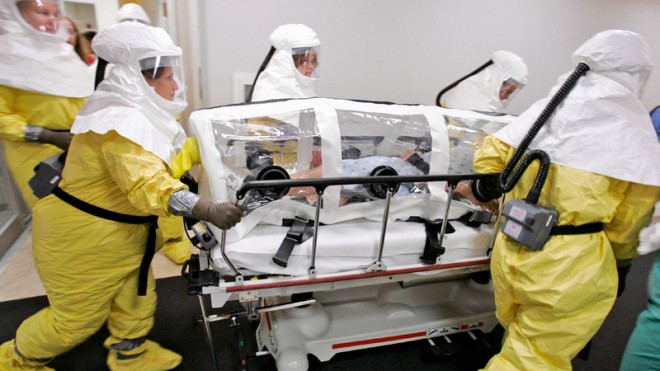US doctor infected with Ebola heading to Nebraska

In this Oct. 28, 2006, file photo, a mock patient is wheeled in an isolation pod during a drill at the Nebraska biocontainment unit in the Nebraska Medical Center in Omaha, Neb. Dr. Rick Sacra, 51, who was infected with Ebola while working in Liberia is being flown to the Nebraska Medical Center in Omaha where he is expected to arrive sometime Friday. Sacra will begin treatment in the hospital’s special isolation unit, believed to be the largest in the U.S. (AP Photo/Nati Harnik)
OMAHA, Nebraska — A doctor who was infected with Ebola while working in Liberia is being flown to a Nebraska hospital for treatment, doctors there said Thursday.
Officials at the Nebraska Medical Center in Omaha said Dr. Rick Sacra, 51, is expected to arrive sometime Friday. Sacra will begin treatment in the hospital’s 10-bed special isolation unit, the largest of four such units in the U.S.
Sacra served with North Carolina-based charity SIM. Its president, Bruce Johnson, said Sacra was receiving excellent care at a center in Liberia, but that the Nebraska facility provides advanced monitoring equipment and a wider availability of treatment options.
Sacra, who is from the Boston area, opted to head to Liberia after hearing that two other missionaries were sick. Sacra wasn’t involved in the treatment of Ebola patients but delivered babies, so it’s unclear how he got infected with the virus that’s killed about 1,900 people.
He’s the third American aid worker infected by the Ebola. The first two — Dr. Kent Brantly and Nancy Writebol — have recovered since being flown to Emory University Hospital in Atlanta for treatment.
Article continues after this advertisementDr. Phil Smith, medical director of the Omaha unit, would not say what time or where Sacra would arrive, citing public safety and patient confidentiality concerns. Smith and several other doctors with the unit repeatedly said Sacra’s transfer to Omaha posed no threat to the public, noting Ebola is transmitted through close contact with an infected person.
Article continues after this advertisementHe said Sacra was in stable condition in Liberia and was able to board the plane to the U.S. under his own power, but added, “He has a long plane ride ahead of him.”
Doctors in Omaha will focus on providing him basic care, Smith said, including keeping him hydrated and keeping his vital signs stable. Smith said a team of 35 doctors, nurses and other medical staffers will attend to Sacra.
The team is discussing experimental treatments, including using blood serum from a patient who has recovered from Ebola, Smith said.
“We’ve been trying to collect as much information on possible treatments as we can,” Smith said.
There are no licensed drugs or vaccines for the disease, but about a half dozen are in development. None has been tested in humans, but an early trial of one vaccine began this week in the United States.
Much attention has focused on the unproven drug ZMapp, which was given to seven patients, two of whom died. But the limited supply is now exhausted and its developer says it will take months to make even a modest amount.
Sacra’s wife, Debbie, said in a news conference at the University of Massachusetts Medical Center in Worcester that her husband was in good spirits as he boarded the plane Thursday. She said the couple had known there was a risk of him getting infected with Ebola when he left for Liberia in August.
RELATED STORIES
Experts debate experimental treatments for Ebola